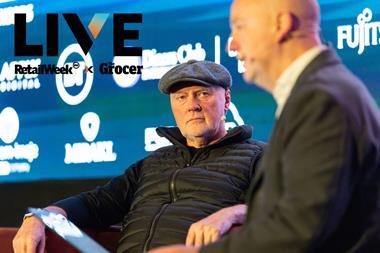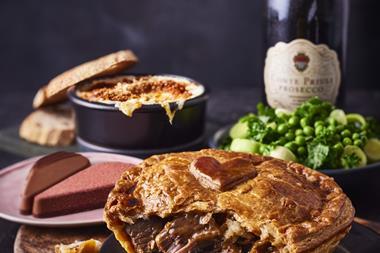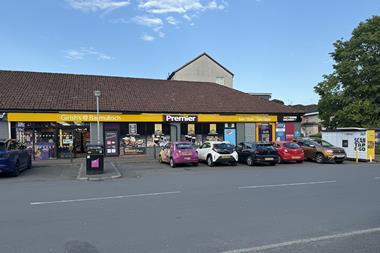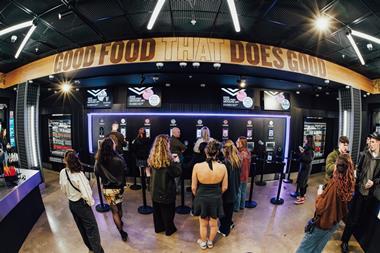Asda has decided to bring back the e-auction. While it stands to benefit from more efficient negotiating, suppliers are not so happy. James Ball reports
The tension of competing in a sealed-bid auction is familiar to anyone with a passion for TV property shows. And now it's a feeling shared by supermarket suppliers, with some of the big four returning to blind e-auctions for their own-label lines.
Last week, The Grocer revealed Asda was once again using e-auctions to allocate some of its own-label business, despite phasing out their use four years ago when Richard Hodgson (now at Waitrose) became director of grocery. Asda says the auctions are a simple mechanism to save time and cut costs in negotiations, but suppliers worry they make price the overriding factor of negotiation and damage relationships. Bringing back e-auctions is a powerful symbol of just how focused on price retailers are becoming. But if they didn't work before, why will they work now?
'A more scientific version'
In recent months price has become the dominant theme in advertising from Asda, Morrisons and Tesco, and retailers and suppliers have had tough negotiations to support these campaigns, typified by the creation of Tesco's "Discounter House" talks.
As such, e-auctions seem to fit the retail environment better than they have for some time. For a minority of its own-label business, Asda invites suppliers to submit a single bid into an online system. Unlike when auctions were last used, however, suppliers cannot see rival bids, or how many companies have submitted a figure. On the closing date, negotiations begin. The lowest bid doesn't necessarily win, but will be used as a basis for negotiations. Asda says the auctions are used only for commodity-type products, such as bottled water or bulk Cheddar, but other suppliers report having to bid in e-auctions to keep their current contracts.
"Negotiating the lowest cost price from our suppliers is nothing new, our teams do this day-in, day-out to be able to deliver everyday low prices to customers," says an Asda spokeswoman. "The online auctions are a new system for Asda, although it's really only a more scientific version of the processes we already have in place. They have been reintroduced to save time, help reduce our operating costs, and in turn reduce prices even further for customers."
An exact product specification, and trading terms, are set out at the beginning of the process. Typically, the spokeswoman says, Asda then negotiates first with the lowest bidder, to establish the viability of the supplier. "Suppliers should be responsible enough to submit costs that they are able to sustain as a business, just as they do in normal negotiations," she adds. "If we don't feel the offer is financially viable for them we would discount it."
'Better value for customers'
Asda is not alone in reintroducing auctions as a negotiation tool. Though Sainsbury's says it does not use blind auctions and has no plans to introduce them, Tesco says it uses them "from time to time", while Morrisons confirms blind auctions are one of the tools in its arsenal.
"We have used e-auctions for a number of years across the business," says group trading director Martyn Jones. "The precise nature of the auction depends on the particular product and the number of suppliers involved, but generally speaking we would say this is an important tool that we use to bring better value to our customers.
"The key advantages are its simplicity and efficiency, the transparency and fairness it gives to all suppliers and, of course, the control it gives to the buyers."
But some question whether the bidding blind genuinely makes the system more transparent, warning blind auctions often leave suppliers in an uncertain position.
"For commodity products, blind auctions can be a helpful way for retailers to cut costs and complexity," says Aidan Bocci, CEO of Commercial Advantage. "But this can come at the expense of trust. Putting together a bid can involve a lot of effort and cost for suppliers, who then don't know until very late in the process whether they've won the business. There's very little visibility for suppliers so there's a risk some may feel strung along."
Loss of quality
The other risk, Bocci says, is loss of quality. Product testing is rare for contracts allocated by own label, and coupled with the drive to low price, retailers risk getting the lowest possible product allowable by the spec - and could even get a poor product for the price they pay.
The first era of e-auctions also throws up reasons for caution. Auctions were examined (often briefly) during the course of several Competition Commission inquiries in the early noughties.
Waitrose told the Competition Commission it did not use the system, fearing it damaged relationships with suppliers. "It might be possible to save money by conducting a net auction," read the report, "but it did not want to risk destroying its relationship with its supply base because that might cost it more in the longer term."
Submissions from some suppliers showed signs of this breakdown in trust. The then-chairman of Geest (since taken over by Bakkavör), Sir John Banham, accused supermarkets of abusing blind auctions by manufacturing "phantom bids" and using these to negotiate suppliers downwards. It's a charge the retailers have categorically and consistently denied, but some suppliers still cite these suspicions as an example of the breakdown in relationships auctions can cause.
Playing poker with livelihoods
"Sealed-bid auctions feel like playing poker, but with people's livelihoods," says one supplier. "We don't allow it to change how we'd price a contract, but you're left hoping none of your rivals are looking to buy business, or get carried away - loss-leaders do exist in manufacturing as well as retail. Ultimately, the auctions just create a much tougher first negotiation point, it does still all come down to that. They're just out of our comfort zone somewhat. We're salesmen, we like to sell face to face, not just put a number in a box!"
"Some retailers will typically only look at price in a contract, but the more far-sighted ones will also consider the longer-term picture," says an executive at one food manufacturer. "That's one where contracts look at how manufacturers can help retailers invest to develop their products, and vice versa.
"We believe a two-way relationship is by far the most fruitful one for food manufacturers and retailers. Ultimately price is always a large driver, but quality and the ability for suppliers to invest are inherent to the service provided."
Supermarkets and their suppliers agree e-auctions have the potential to reduce the time and complexity of negotiations. For some suppliers, however, e-auctions symbolise what they feel is a shift in the power of the supply relationship. It's a shift too far.
The tension of competing in a sealed-bid auction is familiar to anyone with a passion for TV property shows. And now it's a feeling shared by supermarket suppliers, with some of the big four returning to blind e-auctions for their own-label lines.
Last week, The Grocer revealed Asda was once again using e-auctions to allocate some of its own-label business, despite phasing out their use four years ago when Richard Hodgson (now at Waitrose) became director of grocery. Asda says the auctions are a simple mechanism to save time and cut costs in negotiations, but suppliers worry they make price the overriding factor of negotiation and damage relationships. Bringing back e-auctions is a powerful symbol of just how focused on price retailers are becoming. But if they didn't work before, why will they work now?
'A more scientific version'
In recent months price has become the dominant theme in advertising from Asda, Morrisons and Tesco, and retailers and suppliers have had tough negotiations to support these campaigns, typified by the creation of Tesco's "Discounter House" talks.
As such, e-auctions seem to fit the retail environment better than they have for some time. For a minority of its own-label business, Asda invites suppliers to submit a single bid into an online system. Unlike when auctions were last used, however, suppliers cannot see rival bids, or how many companies have submitted a figure. On the closing date, negotiations begin. The lowest bid doesn't necessarily win, but will be used as a basis for negotiations. Asda says the auctions are used only for commodity-type products, such as bottled water or bulk Cheddar, but other suppliers report having to bid in e-auctions to keep their current contracts.
"Negotiating the lowest cost price from our suppliers is nothing new, our teams do this day-in, day-out to be able to deliver everyday low prices to customers," says an Asda spokeswoman. "The online auctions are a new system for Asda, although it's really only a more scientific version of the processes we already have in place. They have been reintroduced to save time, help reduce our operating costs, and in turn reduce prices even further for customers."
An exact product specification, and trading terms, are set out at the beginning of the process. Typically, the spokeswoman says, Asda then negotiates first with the lowest bidder, to establish the viability of the supplier. "Suppliers should be responsible enough to submit costs that they are able to sustain as a business, just as they do in normal negotiations," she adds. "If we don't feel the offer is financially viable for them we would discount it."
'Better value for customers'
Asda is not alone in reintroducing auctions as a negotiation tool. Though Sainsbury's says it does not use blind auctions and has no plans to introduce them, Tesco says it uses them "from time to time", while Morrisons confirms blind auctions are one of the tools in its arsenal.
"We have used e-auctions for a number of years across the business," says group trading director Martyn Jones. "The precise nature of the auction depends on the particular product and the number of suppliers involved, but generally speaking we would say this is an important tool that we use to bring better value to our customers.
"The key advantages are its simplicity and efficiency, the transparency and fairness it gives to all suppliers and, of course, the control it gives to the buyers."
But some question whether the bidding blind genuinely makes the system more transparent, warning blind auctions often leave suppliers in an uncertain position.
"For commodity products, blind auctions can be a helpful way for retailers to cut costs and complexity," says Aidan Bocci, CEO of Commercial Advantage. "But this can come at the expense of trust. Putting together a bid can involve a lot of effort and cost for suppliers, who then don't know until very late in the process whether they've won the business. There's very little visibility for suppliers so there's a risk some may feel strung along."
Loss of quality
The other risk, Bocci says, is loss of quality. Product testing is rare for contracts allocated by own label, and coupled with the drive to low price, retailers risk getting the lowest possible product allowable by the spec - and could even get a poor product for the price they pay.
The first era of e-auctions also throws up reasons for caution. Auctions were examined (often briefly) during the course of several Competition Commission inquiries in the early noughties.
Waitrose told the Competition Commission it did not use the system, fearing it damaged relationships with suppliers. "It might be possible to save money by conducting a net auction," read the report, "but it did not want to risk destroying its relationship with its supply base because that might cost it more in the longer term."
Submissions from some suppliers showed signs of this breakdown in trust. The then-chairman of Geest (since taken over by Bakkavör), Sir John Banham, accused supermarkets of abusing blind auctions by manufacturing "phantom bids" and using these to negotiate suppliers downwards. It's a charge the retailers have categorically and consistently denied, but some suppliers still cite these suspicions as an example of the breakdown in relationships auctions can cause.
Playing poker with livelihoods
"Sealed-bid auctions feel like playing poker, but with people's livelihoods," says one supplier. "We don't allow it to change how we'd price a contract, but you're left hoping none of your rivals are looking to buy business, or get carried away - loss-leaders do exist in manufacturing as well as retail. Ultimately, the auctions just create a much tougher first negotiation point, it does still all come down to that. They're just out of our comfort zone somewhat. We're salesmen, we like to sell face to face, not just put a number in a box!"
How Asda's e-auctions work
- Asda is bringing back e-auctions for commodity-type products such as cheese and bottled water
- Suppliers are invited to submit a single bid into an online system
- The bids are blind and suppliers have no idea how many rivals have bid
- The lowest bid will not necessarily win the contract, but it will be used as a starting point for negotiations
This feeling is echoed by other manufacturers, one of whom even says that tough negotiating tactics like M&S's Project Genesis or Waitrose's recent letter to suppliers asking for 2% cuts were preferable to auctions, as in his view they "at least implied a relationship".- Asda is bringing back e-auctions for commodity-type products such as cheese and bottled water
- Suppliers are invited to submit a single bid into an online system
- The bids are blind and suppliers have no idea how many rivals have bid
- The lowest bid will not necessarily win the contract, but it will be used as a starting point for negotiations
"Some retailers will typically only look at price in a contract, but the more far-sighted ones will also consider the longer-term picture," says an executive at one food manufacturer. "That's one where contracts look at how manufacturers can help retailers invest to develop their products, and vice versa.
"We believe a two-way relationship is by far the most fruitful one for food manufacturers and retailers. Ultimately price is always a large driver, but quality and the ability for suppliers to invest are inherent to the service provided."
Supermarkets and their suppliers agree e-auctions have the potential to reduce the time and complexity of negotiations. For some suppliers, however, e-auctions symbolise what they feel is a shift in the power of the supply relationship. It's a shift too far.



















No comments yet